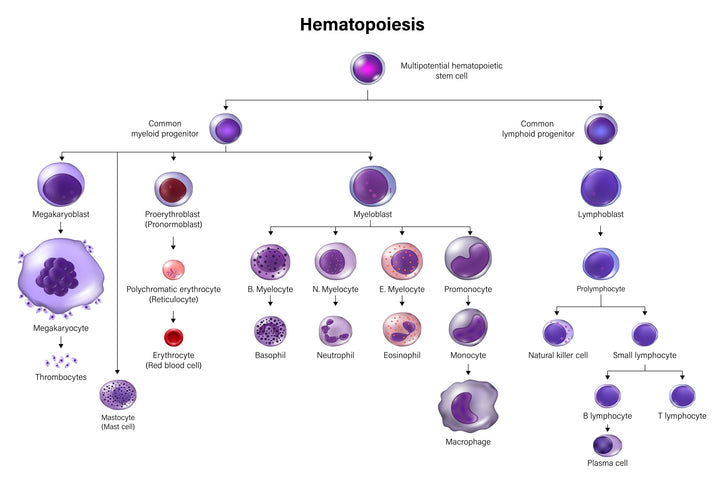An interesting fact about epigenetics is that the food you eat, the amount of stress you experience, and even your exposure to pollutants can all cause epigenetic changes that may significantly affect your health.
Epigenetics is a fascinating field of genetics that explores how your environment and behaviours can modify your genes work. Unlike genetic changes, which alter the DNA sequence, epigenetic changes are reversible and do not change the DNA sequence itself, but they can change how your body reads a DNA sequence.
Let's delve deeper into how these changes occur and their potential long-term effects on your body.
How Does Epigenetics Influence Gene Expression?
Epigenetic modifications influence gene expression through various mechanisms. The types of epigenetic changes include:
The Role of DNA Methylation
DNA methylation is a critical epigenetic mechanism that involves adding a methyl group to the DNA molecule, usually at a specific place called a CpG site. This process typically suppresses gene transcription, essentially turning genes off. It is crucial in various biological processes, including embryonic development, X-chromosome inactivation, and genomic imprinting (R).
The Impact of Histone Modification
Histones are proteins around which DNA winds, and their modification plays a pivotal role in epigenetic regulation. By altering the histones, cells can control the accessibility of transcriptional machinery to the DNA. Common histone modifications include methylation, acetylation, and phosphorylation, which can either promote or hinder gene expression (R).
Non-coding RNA and Gene Silencing
Non-coding RNAs (ncRNAs) are a type of RNA that don't code for proteins but have roles in regulating gene expression. One of their primary functions in epigenetics is through the process of RNA interference, which can silence gene expression by interacting with mRNA to prevent translation (R).
How Can Your Epigenetics Change Over Time?
Your epigenetic profile evolves over time, influenced by normal developmental and aging processes, as well as by your behaviours and environmental exposures.
Epigenetics Throughout Development
From the moment of conception, epigenetic changes begin to occur rapidly. These changes help direct cell differentiation as embryonic cells develop into the diverse cell types that make up the body, each with its specific function despite having the same DNA (R).
|
An example of epigenetics during development is the formation of different types of blood cells from hematopoietic stem cells in the bone marrow.
|

The Influence of Age on Epigenetics
As we age, our epigenetic markers continue to change in response to how we live. These changes can influence aging and longevity and are influenced by our environment and lifestyle choices (R).
|
For instance, factors like exercise, diet, and cognitive engagement can induce changes in DNA methylation patterns in neurons, potentially enhancing cognitive function and neuroplasticity (R). |
Reversibility of Epigenetic Changes
One of the most compelling aspects of epigenetics is the reversibility of some epigenetic modifications, which implies that lifestyle changes and environmental shifts can potentially reverse negative epigenetic changes or promote beneficial ones (R).
|
For example, reducing excessive fat intake and alcohol can decrease the epigenetic marks that contribute to liver inflammation and fat accumulation, thus helping to reverse conditions like fatty liver disease (R). |
The Connection Between Epigenetics and Health
Epigenetic modifications can impact your health in various significant ways:
Epigenetics and Infectious Diseases
Epigenetic mechanisms can influence the immune response to infections. For instance, DNA methylation patterns can change in response to infections, potentially altering the susceptibility to future infections or the severity of the disease (R).
|
During a tuberculosis (TB) infection, the Mycobacterium tuberculosis bacterium triggers changes in the DNA methylation of macrophages, which are crucial immune cells. These epigenetic changes can alter gene expression involved in inflammation, influencing whether the infection is contained or progresses (R).
|
The Link Between Epigenetics and Cancer
Cancer is strongly associated with epigenetic changes such as abnormal DNA methylation and histone modifications, which can lead to the activation of oncogenes or the silencing of tumour suppressor genes (R).
|
In colorectal cancer, epigenetic changes are evident through abnormal DNA methylation patterns that silence crucial tumor suppressor genes like MLH1. This gene is essential for DNA repair, and its silencing due to hypermethylation in the promoter region reduces the cell's capacity to fix mutations, thereby increasing the risk of tumor development (R). |
The Importance of Nutrition During Pregnancy
The prenatal nutritional environment can lead to epigenetic changes affecting the child's health outcomes. For example, folic acid intake during pregnancy is crucial as it can influence DNA methylation processes for proper fetal development and long-term health (R).
|
One study examined how maternal folic acid intake during pregnancy affects the epigenetic regulation of genes associated with autism spectrum disorder (ASD). They found that inadequate folic acid intake led to altered DNA methylation patterns in children at high risk for ASD. These changes were linked to an increased risk of ASD-related traits and cognitive impairments. This study emphasises the crucial role of prenatal nutrition in influencing long-term neurodevelopmental outcomes (R). |
Conclusion
Epigenetics offers a powerful lens through which we can understand the profound influence of lifestyle and environment on our genetic blueprint. It underscores that our choices and surroundings can directly impact our genetic expression and long-term health, offering a promising avenue for personalised medicine and interventions.
Interested in how you can influence your own epigenetic outcomes through lifestyle changes? Start by learning more about how your everyday actions—from diet to stress management—can alter your epigenetic landscape, paving the way for better health and wellness.
Discover more on the topic of epigenetics and how the they are used for assessing how you age →





